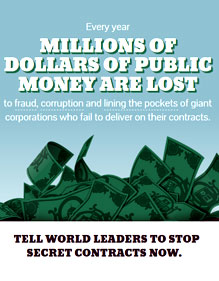|
Getting your Trinity Audio player ready...
|
 Every year billions of dollars of public money are lost to fraud and corruption, disappearing into the pockets of government officials who take bribes to issue contracts to certain suppliers, and suppliers who fail to deliver on their contracts. Not only that, but if a company offering a sub-standard service or product pays a bribe to secure the contract, the project is compromised and may incur extra costs in the long term – often at the taxpayer’s expense.
Every year billions of dollars of public money are lost to fraud and corruption, disappearing into the pockets of government officials who take bribes to issue contracts to certain suppliers, and suppliers who fail to deliver on their contracts. Not only that, but if a company offering a sub-standard service or product pays a bribe to secure the contract, the project is compromised and may incur extra costs in the long term – often at the taxpayer’s expense.
One of the reasons these unscrupulous people can get away with underhanded deals is a lack of transparency towards the very people who, through their tax money, help to fund public contracts to the tune of over $9.5 trillion each year. They have the right to know who gets their money, how it was awarded, what was agreed and what benefits it will bring for them.
A new global campaign – Stop Secret Contracts (SSC) – is mobilising people around the world, giving them a voice to demand more transparency from their governments and hold them to account.
The campaign is driven and co-ordinated by the Open Knowledge Foundation (OKFN). It asks supporters, both individual and organisational, to sign a petition which will put added pressure on world leaders to stop the culture of secrecy in contracting. Among the 30 organisational signatories that have so far supported the campaign are Transparency International, the Sunlight Foundation, the UK’s Campaign for Freedom of Information, Kenya-based Code for Africa, and Integrity Watch Afghanistan.
The campaign draws on the work of the Open Contracting Partnership, in particular the Open Contracting Global Principles. It also provides a channel for reporting fraud, corruption or unacceptable outsourcing via e-mail or Twitter using #SecretContracts.
More openness in public contracts
Public contracts should be public by default and classified only when strictly necessary, says OKFN, but the process can be shrouded in opacity even in countries with strong government transparency laws. The organisation says that globally, the amount of money lost to corruption is about $2.6-trillion, or 5% of the global GDP, with some $1-trillion paid over in bribes.
Figures released in 2002 by the African Union put the amount of money lost annually to corruption and mismanagement across the continent at around $150-billion, or 25% of the combined GDP of African countries – this is money that should be used for development. Corruption is especially rife, says OKFN, when it comes to lucrative natural resources like oil and minerals. In the Niger Delta, for instance, over two-million barrels of oil are extracted every day, but the government has not funded a single new road in ten years.
In South Africa estimates vary as to the cost of corruption in government, but figures quoted range from a billion to R30-billion annually, to some 20% of the country’s public procurement. People are fed up with the situation – between January 2012 and January 2014 Corruption Watch received 465 reports related to procurement corruption.
But more needs to be done because any way you look at it, it’s unacceptable. A more profound cost is counted in the families who don't get houses, the roads that don't get built and the hospitals that have no medicines.
This is what SSC aims to eliminate, by “securing commitments and action from government leaders around the world to increasing openness and transparency in their contracts”. It will target governments at both national and international levels to secure these crucial reforms.
“Openness of key contracting information is essential to allow us to hold governments to account, and ensure that public money is used for public good,” said OKFN founder Rufus Pollock in a statement.
“Secret contracts are never about public interest and only serve as conduits to satisfy the selfish interests of a few,” added Transparency International board member Rueben Lifuka. “Giving relevant information about public contracts to government entities, parliaments and civil society contributes to a more stable investment environment, and allows good governance and the rule of law to prevail.”









